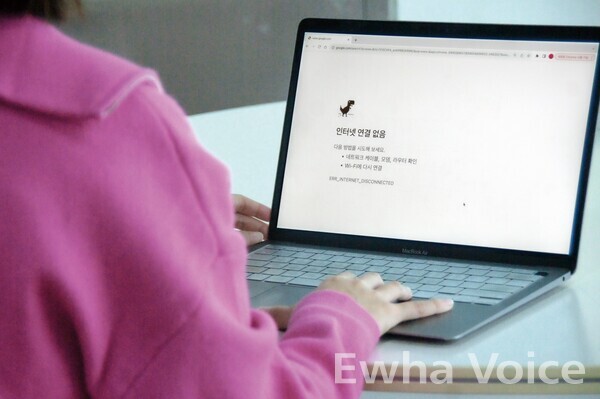
Student concerns about the frequent Wi-Fi disconnections on campus are a longstanding issue to say the least. To settle this matter, Ewha plans to upgrade the wireless LAN before the start of the 2024 semester.
From Sept. 28 to Oct. 31, Ewha Voice conducted a survey among 51 students regarding their concerns over Ewha’s Wi-Fi service. All of the respondents answered that they have experienced problems. Many responses noted buildings that are notorious for their weak Internet connections, namely the dormitories, Hak-gwan, Asan Engineering Building, and Ewha-POSCO Building.
Students reported problems during the course change period, when students have no choice but to quickly leave the building they are in and find a different place during their short break to change courses.
Two students even recalled that online quizzes and exams on Cyber Campus had to be taken in a different form because of the Internet disconnection. Given the severity of these problems, numerous respondents expressed their confusion about why the use of personal routers is forbidden.
Dayeon Lee, a freshman from Scranton Honors Program experienced difficulties completing an assignment in the E-House seminar room due to Wi-Fi connection issues.
“To make matters worse, I was late for a video conference because of the slow Wi-Fi,” Lee said.
Similar to Lee, Kim Hyeseung, a sophomore majoring in electronic and electrical engineering, was unable to access the online attendance system in the New Engineering Building last semester.
“I even tried using cellular data, but that did not work either as our classroom was located on the basement floor,” Kim said.
Kim also added that taking online lectures in the New Engineering Building lounge always entails complications as video playback suffers from frequent buffering.
Professor Hyunggon Park from the Department of Electronic and Electrical Engineering and vice president of the Office of Information and Communications, offered an explanation of Ewha’s connection problems.
“The root of the issue is the age of the current wireless network systems, which were installed in 2015,” Professor Park explained. “This limit both the available range for Internet service, which was based on standards of the time as well as the number of devices each access point (AP) can cover. There is little doubt that since 2015, the number of people and devices per room has seen a significant increase.”
When asked about the school policy of banning personal routers, Professor Park pointed out they may cause security problems. More importantly, using an incorrectly set up personal router may result in network failures for an entire floor or building.
Advising students who have problems using the Internet, Professor Park offered three solutions. For starters, students may move to a different place in case of the location being a temporary gap area. Another issue stems from simultaneously downloading large-capacity data. To avoid slow download speeds, students are encouraged to download classroom materials or installation files prior to class. As a final issue, real- time multimedia programs, including Instagram, YouTube, and Netflix, and software updates for devices will slow down the Internet connection.
On a hopeful note, Professor Park announced that the latest wireless LAN, which is based on Wi-Fi 6E standard (IEEE 802.11ax), is slated to be installed around February 2024.
“This will feature not only 2.4 GHz and 5 GHz but also 6 GHz frequency bands, which will yield high-speed data communication and a reduction in network congestion,” Professor Park said.
While the school Internet problem has been a constant source of inconvenience for students, it will not be long until Ewha students will have access to quick Wi-Fi.

